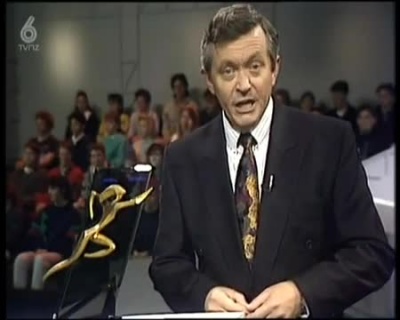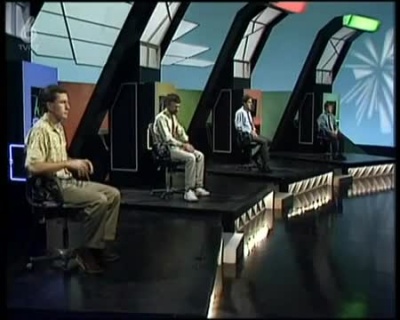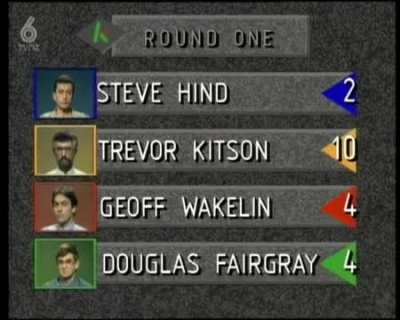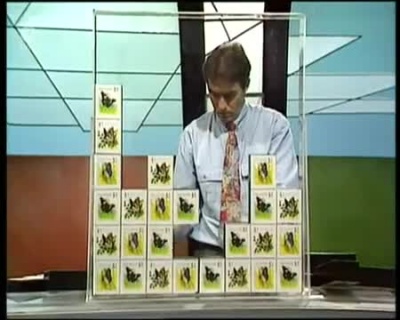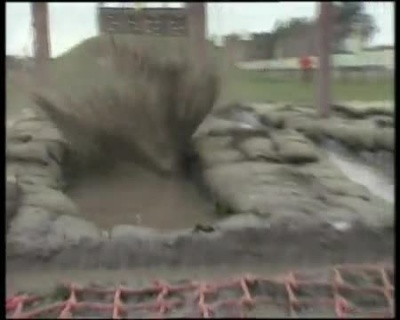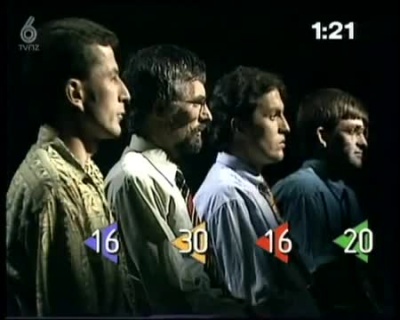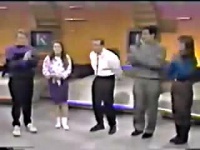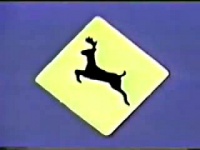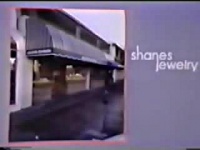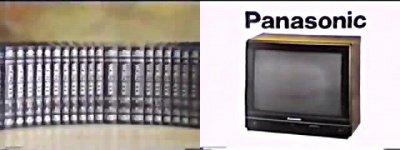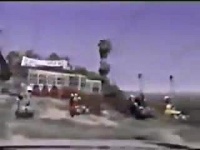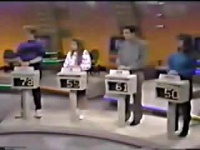Weaver's Week 2012-07-29
(Created page with 'Last week | Weaver's Week Index | Next week Well, we've reached that point where we've covered all th…') |
(fix typo) |
||
| (One intermediate revision not shown) | |||
| Line 1: | Line 1: | ||
| - | [[Weaver's Week 2012-07-22|Last week]] | [[Weaver's Week|Weaver's Week Index]] | [[Weaver's Week 2012-08- | + | [[Weaver's Week 2012-07-22|Last week]] | [[Weaver's Week|Weaver's Week Index]] | [[Weaver's Week 2012-08-05|Next week]] |
Well, we've reached that point where we've covered all the major new shows there are to cover. There's nothing new in our "to review" pile – at least, nothing that we can fashion into a proper Week's review. And there's nothing much on the telly, unless one counts BBC1's wall-to-wall coverage of [[Going for Gold]]. Or [[Pointless]], delete to taste. So we're going to delve into the archives for some old programmes. This week's two, and next week's pair, are variations on a theme. | Well, we've reached that point where we've covered all the major new shows there are to cover. There's nothing new in our "to review" pile – at least, nothing that we can fashion into a proper Week's review. And there's nothing much on the telly, unless one counts BBC1's wall-to-wall coverage of [[Going for Gold]]. Or [[Pointless]], delete to taste. So we're going to delve into the archives for some old programmes. This week's two, and next week's pair, are variations on a theme. | ||
| Line 158: | Line 158: | ||
''To have Weaver's Week emailed to you on publication day, receive our exclusive TV roundup of the game shows in the week ahead, and chat to other ukgameshows.com readers, sign up to our [http://groups.yahoo.com/group/ukgameshows/join Yahoo! Group]. '' | ''To have Weaver's Week emailed to you on publication day, receive our exclusive TV roundup of the game shows in the week ahead, and chat to other ukgameshows.com readers, sign up to our [http://groups.yahoo.com/group/ukgameshows/join Yahoo! Group]. '' | ||
| - | [[Weaver's Week 2012-07-22|Last week]] | [[Weaver's Week|Weaver's Week Index]] | [[Weaver's Week 2012-08- | + | [[Weaver's Week 2012-07-22|Last week]] | [[Weaver's Week|Weaver's Week Index]] | [[Weaver's Week 2012-08-05|Next week]] |
Current revision as of 18:29, 6 December 2016
Last week | Weaver's Week Index | Next week
Well, we've reached that point where we've covered all the major new shows there are to cover. There's nothing new in our "to review" pile – at least, nothing that we can fashion into a proper Week's review. And there's nothing much on the telly, unless one counts BBC1's wall-to-wall coverage of Going for Gold. Or Pointless, delete to taste. So we're going to delve into the archives for some old programmes. This week's two, and next week's pair, are variations on a theme.
Contents |
The Krypton Factor
TVNZ, 1991
We were going to kick off with a brief reminder of the Gordon Burns show, but we watched a UK episode from 1990, and then this New Zealand episode from six months later, and realised that the two were effectively clones. So close that they have the same opening music and show logo. The only difference is the arrangement of the colours: blue – yellow – red – green, not the arrangement we were familiar with.
Host for the programme is Dougal Stevenson, and as the "sample" episode we've found is the grand final, he's pictured with the winner's trophy. With the minimum of fuss, it's efficiently into round one, Mental Agility. The minimum of fuss? A calming, neutral accent? This bloke really is the clone of Gordon Burns.
It's the final, so Mental Agility is going to be a bit taxing. Contenders will be shown a map of New Zealand, with five cities marked, and temperatures assigned for each. In 45 seconds, they'll be asked questions about the map: starting with a simple poser (which city is the most southerly) to ones that require significant processing of the information (how many had temperatures below 21 degrees, what is the sum of the temperatures in North Island). Each contender will face the same set of questions, in the same order, varying only in the slightest detail.
At the end of the 45 seconds, Dougal flatly declares, "Your time is over," and moves on to the next contender. There's no mention of the score, and certainly no time for applause. That can wait for the end of the round, when points are awarded. It's the standard 10-6-4-2 arrangement, but when contenders tie for a place, they're both awarded the lower of the two scores. This differs from the UK arrangement, where ties would see both players given the higher score.
The 1990 British series then went off for the Response round, mostly spent in the Concorde flight simulator, and piloting a mock helicopter to drop Anneka Rice on a moving ship. (Or something.) New Zealand doesn't have the Response round, so it's straight into Observation, a collection of five deliberate continuity errors in a piece of drama. This series re-uses the Sam Smith detective stories shot for the 1990 British series. Two points for each error spotted.
Here's another difference from the UK edition: an advertising break in the middle of The Krypton Factor. Back in Blighty, this was only introduced for the 1993 and 1995 series: though ITV's 2009-10 revival had a break in the middle, this was only used for commercials when the station was showing live football matches that night.
Round three is the Intelligence test. All they've got to do is assemble a set of twelve pentominoes (and a big square) to form a repeating pattern in a frame. When seen on the telly, it all looks very simple: we've no doubt that it took somewhat longer than the two or three minutes seen on screen. Dougal instructs the contenders to "stick to your task until it's done", and we go on to see all four of them finish the puzzle before points are awarded.
While everyone's brain recovers, it's time for round four, Physical Ability. This is an outside broadcast, filmed at an army training course some miles away. There's the traditional combination of obstacles to test all parts of the body – upper- and lower-body strength, stamina, balance across the beams, and the techniques of crossing tramwires and descending a fireman's pole. It's no surprise to see David Prosser credited as the assault course supervisor, a role he'd filled here. The UK course had been re-built for the 1990 series to improve its safety; the New Zealand course was clearly designed around the prior British version, including that concrete tunnel buried into the earth with a rope-climb in the middle, and insisting that everyone gets their knees wet before the final obstacles.
It's a cultural trope that all assault courses must, without exception, end with a zip-wire slide down into a muddy pool. New Zealand's problem is that their ground isn't reliably muddy, so they do the best they can: a zip-wire slide into a trough of muddy water. It'll do. We're less impressed by the light techno music beneath Dougal's narration. Something we never got was supporters on the course, or the host emerging at the end to link to the scores. Both enhance the experience.
After another commercial break, we reach the final round, General Knowledge. Two points for a correct answer, two away for a wrong one, and there's 90 seconds to the win. The British version was famous for having one answer feature somewhere in the next question. The New Zealand one takes a theme (in this case, the number "four") and features it somewhere in every question or answer.
And, at the end of all this, Trevor Kitson emerges as the winner. This is not a surprise, he'd also won the competition in 1990. Winner-stays-on is an interesting dynamic, though it does tend to make champion-of-champions episodes a little tedious: will the winner be Trevor Kitson, or Trevor Kitson? And will anyone notice the difference?
The Krypt-On Factor
Mac III / Granada Television for ABC (US), 1990
Our apologies for the small pictures here; the programme copy we have is of very low quality.
This United Station version is different from the UK one in many ways. For starters, they call it the "Krypt-ON factor"; this side of the pond, "KRYP-tun" is the preferred pronunciation. The voiceover during the titles is from a young woman, and the show's music is light and tinkly, none of the powerful and dramatic pieces that have introduced the programme here.
Willie Aames hosts. Viewers in 1990 will remember him from re-runs of Charles in Charge, Hank in the cartoon Dungeons and Dragons, and a bit-part in Medical Centre. He's since gone on to appear in Celebrity F't Club. Unlike Gordon Burns and Dougal Stevenson, Willie Aames has a high-pitched, almost squeaky voice. Indeed, we could have sworn that Mr. Aames went on to voice Mr. O'Neill in Daria, but we were wrong, that was Marc Thompson.
Anyway, enough of this, on with the show. Before round one, we must meet the contenders. Rather than let Voiceover Girl introduce them, they step forward and do the job themselves. Contenders tell us their given names: some of them tell their location, or ambition, or an interesting fact about themselves. Others tell less of this. It's a bit inconsistent, a bit amateurish.
Wait, "ambition" and "interesting fact"? Yes: all of the players have "occupation" of school student, because they're all about 15. The Krypt-On Factor is for children, not adults. It shows in round one, the Intelligence round.
Now, we remember Test The Nation The National How Good Are You At Doing Intelligence Tests Test, and how the intelligence test professor always insisted that a proper intelligence test would be culturally neutral. It would rely on numbers, shapes, sequences: in theory, a test could be moved from the UK to the US, Sudan, or China, without any significant change.
For the Intelligence round in The Krypt-On Factor, contenders are shown a symbol, and asked to identify it. The international mathematical symbol for equals, the international astrological symbol for Venus. Ten points for a correct answer; five points if a player can buzz in and answer a question correctly. Already, though, we find these questions dubious: they're long-winded, people interrupt and get them wrong. That costs them two points.
Then there's a second pass down the line, this time showing traffic signs. Remember how we said that a good intelligence test is culturally neutral? This one is not at all culture-neutral: it pre-supposes that the United Station road signs are universal. This isn't an Intelligence test in any meaningful way; no, it's a test of Culturally-Specific Knowledge. That's an entirely different part of the brain.
A commercial break follows, and that's followed by a gratuitous plug for some jewellers. And can someone fire the caption writer, because "jewellers" takes two "L"s, thank yer very much. Eventually, we're into round two. The contenders will be shown a clip from an old movie, and asked two questions each. Ten points for a correct answer. While the previous round went left-to-right down the set, this round runs right-to-left.
This Observation round is much more accurately named. The contenders won't have seen the clip before, unless they like watching public domain movies – and using public domain movies means the producers don't need to pay royalties. The questions are asked in order through the film, and enquire after little details, the odd words and precise placement of objects. The only problem with this round is that they show the answer to every question, and then give a ding or a buzz to confirm the result. It goes on a bit, and makes the programme drag rather.
To end the round, Willie walks over to the Krypt-on Cupboard, where there's an object similar to something seen in the clip. He'll give up to five distinct clues as to the object in the cupboard, and players may buzz in to tell him what it is – but each player can only buzz in the once. Ten points for identifying what it is. No prizes for the host, whose conversation has been a little unsettling throughout, and we're finding him more than a little creepy.
More commercials, and a blurb about the prize for the finalists. They'll all get a portable laptop computer running Windows 2.0, and a trip to Space Camp. We don't recall the prize for the UK's Young Krypton (1988-9), but Space Camp sound like the sort of thing it might have been.
We're into round three, the physical ability round. Or, the assault course. Now, we mentioned earlier about the trope that every assault course should end with a death slide. This course begins with its death slide, then continues with a bicycle ride, and other challenges that aren't at all well explained.
Indeed, the narration in this segment is absolutely shocking. For almost a minute, Aames says absolutely nothing, there's just some light tinkly music playing and shots of the contenders looking back on their performance. What is the point of a commentator who doesn't commentate? Even worse, when he does speak, Aames tells us only what we can see with our own eyes – that Joy has fallen into the water, or that Adam has a huge lead. He doesn't explain the course to us, he doesn't say what's going on with all the little tasks – why are the contenders carrying plates, or pouring out jugs of water? There's a story to tell on the course, and we hear nothing of it. 20 points for the winner, diminishing to five for the person coming stock last. Or, as Aames calls it, "our fourth-place winner". Are we quite sure Timothy O'Neill isn't in the room?
It's a difficult task, but this programme is going to find a way to get even worse. The general knowledge round is upon us: two minutes of rapid-fire questions on the buzzers — sorry, on the "lock-outs". Five points for a correct answer, two away for an incorrect response, or no reply at all. The questions adhere to the Krypton Factor tradition, of including the answer in the next question. But they do it so tremendously badly – from the answer "lion", we get the question, "You'd be lyin' if you didn't know..."
The question-setters also commit a cardinal sin of the craft: they give multiple-choice questions where the correct option isn't obvious from the first phrase. For example, "Dumb-bells and bar-bells are..." The question will go on, "...used in body-building or ship-building", but we can't say that the contender replying "weights" was wrong. The host has poor diction, stumbling over his script, and hesitates far more often than we'd expect a professional host to do. This lack of precision leaves at least one contender visibly frustrated.
Eventually, we do have a winner, and they're awarded a colour television and a set of encyclopaedias. The winner may not actually return: at each stage, the top half of the young men and the top half of the young women will progress, regardless of place in their heat. Sixteen become eight become four become two, and the only time lads and lassed compete in open competition is in the final, to crown the United Station Superchild of Nineteen Ninety. Whoever that is, we know the winner of the Worst Host of the Year Award, awarded yearly on a year-by-host basis.
This Week And Next
University Challenge heat 2 pitted St George's London against King's College of Cambridge. St George's is a college of medical students, and from the teams we understand that 75% of students at King's are studying classics. The lead changes hand quite a lot in the opening few minutes, including in the picture round "Name That Marathon". It's about the courses of running races, and not about nut-packed chocolate bars.
Roger Tilling, the announcer, is able to shout out "King's Ace!", not because he's doing well at poker but because one of the players from Cambridge is Amber Ace. One of the Cambridge players is allowed to shout out "Belgium!" and it's not bleeped out. One of the St George's players is allowed to play a game of "Four Square", which gives us a good idea to help fill a space in two week's time. And the set of bonuses on medical terminology in the closing moments will, of course, go to the classicists.
Neither team is ever able to establish a commanding lead, St George's briefly pulls ahead, King's closes the gap, St George's advances again, King's pull them back, and take the lead with about three minutes to play. But with the announcer trying not to explode before the gong, St George's re-take the lead, and three on the geography of Asia assist their cause. St George's ends up the winner, 175-145, and a reasonable draw might see them progress further. King's could be back through the repechage. The one certainty is that there's no UC for the next fortnight; we understand Mastermind returns sooner, on 10 August.
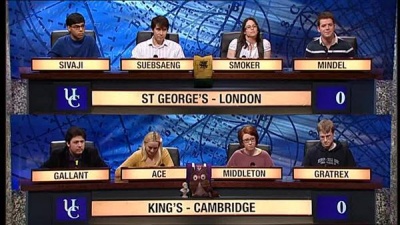 St George's: Shashank Sivaji, Alexander Suebsaeng, Rebecca Smoker, Sam Mindel.
St George's: Shashank Sivaji, Alexander Suebsaeng, Rebecca Smoker, Sam Mindel.
King's Cambridge: Curtis Gallant, Amber Ace, Fran Middleton, James Gratrex.
Britain's Got Talent filled the OFCOM complaints bulletin this fortnight, with ITV grovelling over the failure of the all-singing all-dancing interactive ivote application: apparently, their provider hadn't realised that people will all be connecting at the same time, and didn't provide enough servers to process the votes. There were also complaints about the burlesque act of Beatrix Von Bourbon in the heat and semi-final, this was tastefully edited, carefully signposted, and wasn't held to be unsuitable for children.
Signposts for the future. Big Brother has had another investigation instigated, based on something broadcast on 28 June. We think this is the third inquiry into the current run, but we have lost count a bit. And OFCOM has said that broadcasters don't need to give warnings not to call after televoting lines close, so long as they're 100% certain that callers won't be charged, and they can demonstrate that to OFCOM's satisfaction.
Ratings for the week to 15 July show Secret Fortune was the most popular game show, 4.35m saw the fun. Millionaire brought in 3.85m viewers, and 3.05m people saw Mo Farah crack The Cube. That beat the first performance show on Britain's Got a Brand New Famous Jesus Christ Soapstar Superstar Strictly on Ice II+1!!, seen by just under 3m. Top on BBC2 was Mock the Week, which had 2.65m viewers; Channel 4's best was Come Dine with Me (1.8m), and there's no information for Channel 5.
Higher up the EPG, Hell's Kitchen Us had 675,000 viewers, there were 480,000 for Britain and Ireland's Next Top Model, and 415,000 for Big Brother's Bit on the Side. Whither Come Dine With Me? Just 380,000 saw the Sunday repeat, putting it behind QI on Dave.
Slim pickings for this week. Dave has been preparing for the fortnight, with a stockpile of new QI, HIGNFY, and Buzzcocks episodes (weeknights from 9). There's a special edition of Countdown (C4, 3.10 Monday), and Channel 5 promises that the Big Brother lab rats will be completely senseless (9pm Wednesday). Must ... avoid ... obvious ... joke.
To have Weaver's Week emailed to you on publication day, receive our exclusive TV roundup of the game shows in the week ahead, and chat to other ukgameshows.com readers, sign up to our Yahoo! Group.

